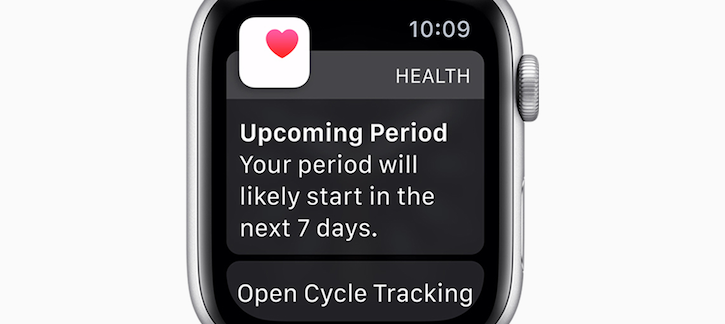Apple Introduces mHealth App for Women to Track Menstrual Cycles, Fertility
The app is a significant step into women’s health for Apple, whose healthcare and wellness portfolio continues to expand.

Photo/Thumb have been modified. Courtesy of Apple.
Consumers may access a new menstrual cycle and fertility tracking app through the iPhone’s Health app with iOS 13 and on the new Apple watchOS 6, according to Apple.
The mobile health (mHealth) app Cycle Tracking will allow women wearing an Apple Watch to log information related to their menstrual cycles and see predicted timing for their next period and fertile window. Women can input information about their current period, flow, symptoms, results from ovulation prediction kits and other fertility-tracking elements. The application will send alerts to the user, including a notification that says when their next period is likely to start.
The release of this software represents Apple’s step into women’s health and fertility, a promising area of digital health. But other health-tech developers have paved the way for the tech giant.
Last year, the U.S. Food and Drug Administration approved Natural Cycles, an mHealth app for contraception. Women can use the app to avoid pregnancy by monitoring their resting body temperature and recording their data. An algorithm then determines their daily fertility.
That app was found to be 93% effective, according to a study published in the journal Fertility and Sterility.
And a United Kingdom-based startup, Fertility Focus, raised $2.7 million in funding earlier this year for a fertility monitor called OvuSense. The tool predicts ovulation up to a day in advance by measuring core body temperature. Fertility Focus claims the technology predicts the date with 99% accuracy.
Still, Apple’s Cycle Tracking is just another rung on the ladder for the company, which has been moving further into many sectors of the digital health and wellness space.
Last year, its electrocardiogram application went live. The company also teamed up with Aetna to develop Attain, an app designed to personalize digital health regimens for the insurer’s beneficiaries. Apple has even entered the electronic health records space and interoperability space.
Apple’s announcement this week also included news of a Noise app, which is designed to help users understand how the sound levels of certain environments affect their hearing. The Apple Watch will send a notification to the user if the noise level reaches 90 decibels, which is when increased exposure can begin affecting hearing.
Get the best insights in digital health directly to your inbox.
Related
Major Study to Track Whether Apple Watch Can Help Improve, Predict Patient Health